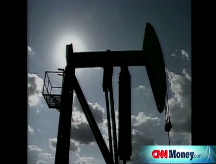America's untapped oil
Lawmakers lay into big oil for leaving million of acres untouched while at the same time asking to drill in Alaska and off the coasts.
 |
| Democrats want to know why the oil industry is asking for more drilling rights when it isn't using the leases it already has. |
NEW YORK (CNNMoney.com) -- Oil companies and many lawmakers are pressing to open up more U.S. areas for drilling. But the industry is drilling on just a fraction of areas it already has access to.
Of the 90 million offshore acres the industry has leases to, mostly in the Gulf of Mexico, it is estimated that upwards of 70 million are not producing oil, according to both Democrats and oil-industry sources.
One Democrat staffer said if all these existing areas were being drilled, U.S. oil production could be boosted by nearly 5 million barrels a day, although the oil industry said that number is far too high and one government agency said it was impossible to estimate production.
Recent proposals to open up offshore coastal areas near Florida and California, as well as Alaska's Arctic National Wildlife Refuge, might yield 2 million additional barrels, according to estimates from various government sources that also stressed the difficulty in making forecasts. The United States currently produces 8 million barrels of oil and other petroleum liquids a day and consumes about 21 million.
Oil companies "should finish what's on their plate before they go back in line," said Oppenheimer analyst Fadel Gheit.
Some Democrats also charge that oil companies are deliberately not drilling on the land to limit supply and drive up oil prices.
"Big Oil is more interested in pumping up prices and pumping up their own profits rather than pumping more oil," said Rep. Edward Markey (D-Mass), who has co-sponsored a bill to charge oil companies a fee for land they hold that's not producing oil. "We should not even begin discussing handing over more public land to the oil companies until they first use [the land] they already hold."
But the oil industry says it pays millions of dollars for these leases, and that it would not make sense to purposely leave the areas untapped.
Rather, years of exploration is required before drilling can even begin. In some cases, no oil is found on leases they hold. In others, drilling the wells and building the pipelines takes years. It is especially hard now that a worldwide boom in oil exploration has pushed up the prices - and timelines - for skilled workers and specialized equipment.
"No one is sitting on leases these days," said Rayola Dougher, senior economic advisor for the American Petroleum Institute. "Those making those assertions don't understand the bidding and leasing process."
Gheit agrees that it's unlikely that hoarding is going on.
With prices at $135 dollars a barrel, everyone is trying to pump as much as they can, he said. But fearing oil prices will eventually fall, the industry is leery about making too many investments in the fields it has - many of which are in deepwater areas that can be pricey to develop.
Instead, they're holding out, hoping the government will open areas closer to shore that would be cheaper to work on.
The presumptive Republican candidate John McCain has come out in favor of lifting bans on oil-drilling off most of the East and West coasts of the United States. Added supply, the thinking goes, would ultimately bring down the price of oil. The bans were enacted in the 1970s following several coastal oil spills.
Critics say lifting the bans would do little to ease the nation's energy crisis in part because it would take years to produce meaningful amounts of oil, noting how much is currently going untapped.
Gheit hasn't seen the legislation proposed by Markey and others, but he thinks the government should revise the leasing process to encourage more drilling on existing areas before it puts more acres up for bid. ![]()


